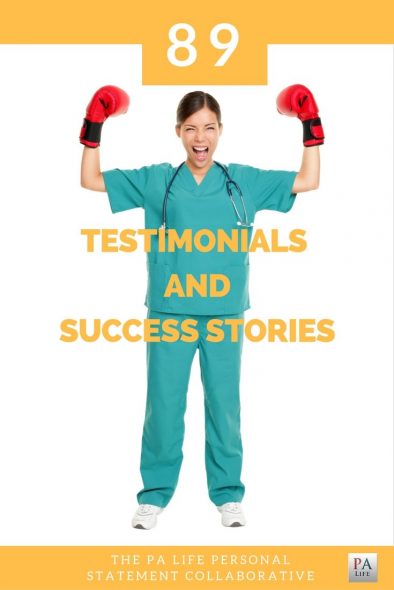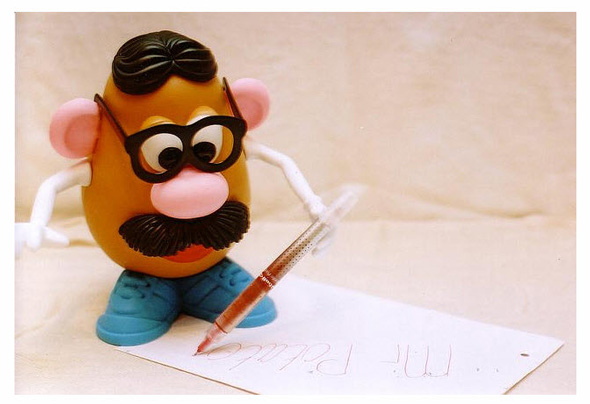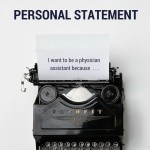Are you ready to get started? Choose your package, and we will begin today!
Single Edit One-on-one Service Supplemental Essays
Your success is our passion. (See just some of our 100's of testimonials and comments below). We are ready to help. Our current PA school essay editing service status (26th April 2024): Accepting New Submissions
(Photo: Me circa 1987, just thinking about my future PA School Essay)
- Are you struggling to write your physician assistant personal statement?
- Are you out of ideas, or just need a second opinion?
- Do you want an essay that expresses who you truly are and grabs the reader's attention in the required 5,000-character limit?
We are here to help perfect your PA school essay
I have written countless times on this blog about the importance of your personal statement in the PA school application process. Beyond the well-established metrics (GPA, HCE/PCE hours, requisite coursework, etc.), the personal statement is the most crucial aspect of your application.
This is your time to express yourself, show your creativity, skills, and background, and make a memorable impression in seconds. This will be your only chance, so you must get it right the first time.
For some time, I had been dreaming about starting a physician assistant personal statement collaborative.
A place where PA school applicants like yourself can post their PA school essays and receive honest, constructive feedback followed by an acceptance letter to the PA school of your choice!
I have been reviewing a ton of essays recently, so many in fact that I can no longer do this on my own.
To solve this problem, I have assembled a team of professional writers, editors, and PA school admissions specialists who worked to revise and perfect my PA school application essay.
 Beth Eakman has taught college writing and worked as a professional writer and editor since the late 1990s. Her projects have involved a wide range of disciplines and media, from editing technical reports to scriptwriting for the PBS Kids show Super Why! Her writing has appeared in publications including Brain, Child Magazine, New York Family Magazine, and Austin Family Magazine. Beth lives with her family just outside Austin, Texas. She is driven to help each client tell the best version of their story and achieve their dream of becoming a physician assistant.
Beth Eakman has taught college writing and worked as a professional writer and editor since the late 1990s. Her projects have involved a wide range of disciplines and media, from editing technical reports to scriptwriting for the PBS Kids show Super Why! Her writing has appeared in publications including Brain, Child Magazine, New York Family Magazine, and Austin Family Magazine. Beth lives with her family just outside Austin, Texas. She is driven to help each client tell the best version of their story and achieve their dream of becoming a physician assistant.
 Deanna Matzen is an author with articles featured in Earth Letter, Health Beats, Northwest Science & Technology, and the Transactions of the American Fisheries Society. With an early career in environmental science, she developed a solid foundation in technical writing. Her communication skills were further honed by producing and editing content for a non-profit website, blog, and quarterly journal. Inspired to extend her craft, she obtained a certificate in literary fiction, which she draws on to build vibrant scenes that bring stories to life. Deanna loves working with pre-PAs who are on the cusp of new beginnings to find their unique story and tell it confidently.
Deanna Matzen is an author with articles featured in Earth Letter, Health Beats, Northwest Science & Technology, and the Transactions of the American Fisheries Society. With an early career in environmental science, she developed a solid foundation in technical writing. Her communication skills were further honed by producing and editing content for a non-profit website, blog, and quarterly journal. Inspired to extend her craft, she obtained a certificate in literary fiction, which she draws on to build vibrant scenes that bring stories to life. Deanna loves working with pre-PAs who are on the cusp of new beginnings to find their unique story and tell it confidently.
 Carly Hallman is a professional writer and editor with a B.A. in English Writing and Rhetoric (summa cum laude) from St. Edward's University in Austin, Texas. She has worked as a curriculum developer, English teacher, and study abroad coordinator in Beijing, China, where she moved in 2011. In college, she was a Gilman Scholar and worked as a staff editor for her university's academic journal. Her first novel, Year of the Goose, was published in 2015, and her first memoir is forthcoming from Little A Books. Her essays and creative writing have appeared in The L.A. Review of Books, The Guardian, LitHub, and Identity Theory, among other publications.
Carly Hallman is a professional writer and editor with a B.A. in English Writing and Rhetoric (summa cum laude) from St. Edward's University in Austin, Texas. She has worked as a curriculum developer, English teacher, and study abroad coordinator in Beijing, China, where she moved in 2011. In college, she was a Gilman Scholar and worked as a staff editor for her university's academic journal. Her first novel, Year of the Goose, was published in 2015, and her first memoir is forthcoming from Little A Books. Her essays and creative writing have appeared in The L.A. Review of Books, The Guardian, LitHub, and Identity Theory, among other publications.
Read more client testimonials or purchase a revision
We Work as a Team
Our team of professional editors is wonderful at cutting out the "fluff" that makes an essay lose focus and sets people over the 5,000-character limit. Their advice is always spot-on.
Sue, Sarah, and Carly are amazingly creative writers who will take your "ordinary" and turn it into entirely extraordinary.
I mean it when I say this service is one-of-a-kind! We have spent countless hours interviewing PA School admissions directors and faculty from across the country to find out exactly what it is they are looking for in your personal statement.
We even wrote a book about it.
 To collaborate, we use Google Drive. Google Drive is free, has an intuitive interface with integrated live comments in the sidebar, the ability to have a real-time chat, to collaborate effortlessly, and to compare, revise, or restore revisions on the fly. Google Drive also has an excellent mobile app that will allow you to make edits on the go!
To collaborate, we use Google Drive. Google Drive is free, has an intuitive interface with integrated live comments in the sidebar, the ability to have a real-time chat, to collaborate effortlessly, and to compare, revise, or restore revisions on the fly. Google Drive also has an excellent mobile app that will allow you to make edits on the go!
Our team has worked with hundreds of PA school applicants within the Google Drive environment, and we have had enormous success.
The Physician Assistant Essay and Personal Statement Collaborative
I have set up two options that I hope will offer everyone a chance to participate:
- One-of-a-kind, confidential, paid personal statement review service
- A collaborative, free one (in the comments section)
Private, One-On-One Personal Statement Review Service
If you are interested in the paid service, you may choose your plan below.
The Personal Statement Review Service is:
- Behind closed doors within a private, secure network using Google Drive.
- It is completely interactive, meaning we will be able to provide real-time comments and corrections using the Google Drive interface.
- Telephone consultations are included with all edits above the single edit level. It’s often hard to communicate exactly what you want hundreds of miles away; for this reason, we offer the option to edit right along with us over the telephone while sharing in real-time over Google Drive. This is an option available to all our paid clients who purchase above the single edit level.
- We provide both revision and editing of all essays. What’s the difference? See below
- We will provide feedback, advice, and help with brainstorming and topic creation if you would like.
- We will help with a “final touch-up” before the big day, just in case your essay needs a few minor changes.

Why Choose Our Service?
- It’s not our opinion that matters. We have gone the extra step and personally interviewed PA school administrators from across the US to find out exactly what they think makes a personal statement exceptional.
- We are a team of PAs and professional writers, having worked over ten years with PA school applicants like yourself, providing countless hours of one-on-one editing and revision.
- Our clients receive interviews, and many go on to receive acceptance into their PA School of choice.
Because we always give 100%, we will open the essay collaborative for a limited number of applicants each month and then close this depending on the amount of editing that needs to be done and the time that is available.
Our goal is not quantity but quality. We want only serious applicants who are serious about getting into PA school.
Writing is not a tool like a piece of software but more like how a photograph can capture your mood. It’s more like art. The process of developing a unique, memorable personal statement is time-intensive, and it takes hours to compose, edit, finalize, and personalize an essay.
As Antoinette Bosco once said:
And this is why I am charging for this service. We love helping people find stories that define their lives, and we love helping individuals who have the passion to achieve their dreams. It’s hard to describe the feeling I get when an applicant writes back to tell me they were accepted into PA school.
There is no price tag I can place on this; it’s the feeling we get when we help another human being. It’s just like providing health care. But this takes time.
Interested? Choose your plan below.
Read more client testimonials.
Free Personal Statement Review
Post your essay in the comments section for a free critique
We want to make this opportunity available to everyone who would like help with their essay, and that is why we are offering free, limited feedback on the blog.
You post your essay in the comments section, and you will get our critique. It is that easy. We will try to give feedback to every single person who posts their COMPLETE essay here on this blog post in the comments section.
Also, by posting your comment, we reserve the right to use your essay.
We will provide feedback on essays that are complete and fit the CASPA requirements (View CASPA requirements here). We will not provide feedback on partial essays or review opening or closing statements. Your essay will be on a public platform, which has both its benefits and some obvious drawbacks. The feedback is limited, but we will try to help in any way we can.
Note: Comment Rules: Remember what Fonzie was like? Cool. That’s how we’re gonna be — cool. Critical is fine, but if you’re rude, I will delete your stuff. Otherwise, have fun, and thanks for adding to the conversation! And this should go without saying: if you feel the need to plagiarize someone else’s content, you do not deserve to go to PA school.
* Also, depending on the time of year, it may take me several weeks to reply!
We love working with PA school applicants, but don't just take our word for it!
How to submit your essay for the paid service
If you are serious and would like to have real, focused, and personalized help writing your personal statement, please choose your level of service and submit your payment below.
After you have submitted your payment, you will be redirected to the submissions page, where you can send us your essay as well as any special instructions. We will contact you immediately upon receipt of your payment and essay so we may begin work right away.
Pricing is as follows:
Choose your plan, then click "Buy Now" to submit your essay, and we will get started right away!
Every purchase includes a FREE digital copy of our new 100-page eBook, How to Write Your Physician Assistant Personal Statement, Our 101 PA School Admission Essays e-book, the expert panel audiobook, and companion workbook. This is a $65 value included for free with your purchase.
All credit card payments are processed via PayPal over a secure HTTPS server. Once your payment is processed, you will be immediately redirected back to the essay submission page. There, you will submit your essay along with some biographical info and all suggestions or comments you choose to provide. You will receive immediate confirmation that your essay has been securely transmitted as well as your personal copy of "How to Write Your Physician Assistant Personal Statement." Contact [email protected] if you have any questions, comments, or problems - I am available 24/7.
The hourly service includes your original edit and one-on-one time over Google Drive. It is simple to add more time if necessary, but you may be surprised at what a difference just a single edit can make. We find our four-hour service to be the most effective in terms of time for follow-up and full collaboration. We are open to reduced-rate add-ons to suit your individual needs.
Writing and Revision
All writing benefits from rewriting when done well.
When you are in the process of writing a draft of an essay, you should be thinking first about revision, not editing.
What’s the difference?
Revision refers to the substantial changing of text. For example, it may include re-organizing ideas and paragraphs, providing additional examples or information, and rewriting a conclusion for clarity.
Editing, on the other hand, refers to correcting mistakes in spelling, grammar, and punctuation.
On all submissions, we perform both revision and editing.
How to submit your PA school essay for the FREE editing service
Follow the rules above and get to work below in the comments section. I look forward to reading all your essay submissions.
- Stephen Pasquini PA-C
View all posts in this series
- How to Write the Perfect Physician Assistant School Application Essay
- The Physician Assistant Essay and Personal Statement Collaborative
- Do You Recognize These 7 Common Mistakes in Your Personal Statement?
- 7 Essays in 7 Days: PA Personal Statement Workshop: Essay 1, “A PA Changed My Life”
- PA Personal Statement Workshop: Essay 2, “I Want to Move Towards the Forefront of Patient Care”
- PA Personal Statement Workshop: Essay 3, “She Smiled, Said “Gracias!” and Gave me a Big Hug”
- PA Personal Statement Workshop: Essay 4, “I Have Gained so Much Experience by Working With Patients”
- PA Personal Statement Workshop: Essay 5, “Then Reach, my Son, and Lift Your People up With You”
- PA Personal Statement Workshop: Essay 6, “That First Day in Surgery was the First Day of the Rest of my Life”
- PA Personal Statement Workshop: Essay 7, “I Want to Take People From Dying to Living, I Want to Get Them Down From the Cliff.”
- Physician Assistant Personal Statement Workshop: “To say I was an accident-prone child is an understatement”
- 9 Simple Steps to Avoid Silly Spelling and Grammar Goofs in Your PA School Personel Statement
- 5 Tips to Get you Started on Your Personal Essay (and why you should do it now)
- How to Write Your Physician Assistant Personal Statement The Book!
- How to Write “Physician Assistant” The Definitive PA Grammar Guide
- 101 PA School Admissions Essays: The Book!
- 5 Things I’ve Learned Going Into My Fourth Physician Assistant Application Cycle
- 7 Tips for Addressing Shortcomings in Your PA School Personal Statement
- The #1 Mistake PRE-PAs Make on Their Personal Statement
- The Ultimate PA School Personal Statement Starter Kit
- The Ultimate Guide to CASPA Character and Space Limits
- 10 Questions Every PA School Personal Statement Must Answer
- 5 PA School Essays That Got These Pre-PAs Accepted Into PA School
- 7 Questions to Ask Yourself While Writing Your PA School Personal Statement
- 101 PA School Applicants Answer: What’s Your Greatest Strength?
- 12 Secrets to Writing an Irresistible PA School Personal Statement
- 7 Rules You Must Follow While Writing Your PA School Essay
- You Have 625 Words and 2.5 Minutes to Get Into PA School: Use Them Wisely
- What’s Your #1 Personal Statement Struggle?
- 31 (NEW) CASPA PA School Personal Statement Examples
- How to Prepare for Your PA School Interview Day Essay
- Should You Write Physician Associate or Physician Assistant on Your PA School Essay?
- Meet the World’s Sexiest PA School Applicants
- PA School Reapplicants: How to Rewrite Your PA School Essay for Guaranteed Success
- How to Write a Personal Statement Intro that Readers Want to Read
- PA School Reapplicant Personal Statement Checklist
- How to Deal with Bad News in Your Personal Statement
- Inside Out: How to use Pixar’s Rules of Storytelling to Improve your PA Personal Statement
- Ratatouille: A Pixar Recipe for PA School Personal Statement Success
- Personal Statement Panel Review (Replay)
- Mind Mapping: A Tool for Personal Statements, Supplemental Essays, and Interviews
- Start at the End: Advice for your PA School Personal Statement

















“One of our passengers is needing urgent medical attention, if there are any doctors on the plane please make your way to the front.” My head is on a swivel, looking around to comprehend what is happening. A few rows up, I noticed another passenger attempting to keep a woman awake as she was grappling with consciousness. I had sunk back into my seat, as my eyes followed healthcare providers rising from their seats. It was the first time I witnessed a medical emergency. After what felt like hours, the plane landed, and medical personnel made their way on the plane and escorted the woman for further medical attention. All remaining passengers grabbed their luggage and exited the plane, their thoughts remained unspoken. I remained seated feeling helpless. In that moment, I realized I no longer wanted to be a bystander.
Throughout college, I began working at Arthritis Osteoporosis Consultants of the Carolinas (AOCC) part time as a certified nursing assistant (CNA). My time as a CNA consisted of rooming patients, taking vitals, documenting concerns, charting, and practicing sanitation after each patient. Acquiring this certification allowed me to be able to support patients and eliminate the helpless feeling I have had. Not only was I able to use medicine as support, but being a first generation allowed me to grow patient connections and confidence with those who are not as comfortable with the English language.
One main aspect of working in the healthcare setting that I admire is being able to speak Spanish with patients and having the opportunity to translate their visits. Hearing things like “I am so thankful Spanish speaking nurses work here” or “we need more people like you” has boosted my desire to become more in a place like medicine. I am grateful to be bilingual as I am able to eliminate the sense of vulnerability in all my patients.
In the story above, the passenger on my flight had a heart attack. I could hear conversations going on between the flight attendants and the passenger as she struggled to speak broken English. Luckily, I was only a few seats down and I had a strong urge to approach the medical scene and translate for the passengers. In a situation where a person needs medical attention, and they feel as if they cannot communicate properly, their situation is ten times more intimidating and if I was going to be watching the scene, I might as well have made myself useful. I was in communication between the flight attendants and the passenger when she snapped back into the scene, and in that moment, even if I was not the one physically trying to save her life, I had this sense of satisfaction and felt that is exactly where I belonged in that moment. I could tell that every time she gained consciousness, she looked grateful to have help around her, and spoke to me with a look of relief. While being a part of that scene, I knew I wanted to do more and did not want to waste any time.
While I learned a lot acquiring my CNA certification, I craved more healthcare experience. I saw the chance to learn phlebotomy and I seized it. I acquired my phlebotomy technician certification a few months later. Obtaining these certifications has moved me one step closer to becoming a physician assistant (PA), and one step away from being only just a bystander. Regardless of obtaining these certifications, this did not fully satisfy the desire I had to become a PA as I wanted to play a larger role in patient care.
Upon graduation, I was offered a full-time position at AOCC which I accepted. I was trained to do more at the office like administering intramuscular and subcutaneous injections and drawing up joint injections, refilling medications, appointment scheduling, and calling patients with lab results, information, etc. I work closely with multiple providers, including PAs, nurse practitioners (NPs), and physicians. I have noticed differences in their daily responsibilities and have had the privilege to work alongside a rheumatologist daily, knowledgeable NPs, and incredible PAs as needed who were nearly indistinguishable from the physicians. Doing so has given me the advantage to quickly grasp the understanding of all three professions. Because of my experience at this office and knowing I wanted to be in medicine right away, my path was clearly drawn out—I wanted to become a PA.
PAs have a greater focus on patient care, re-specialize in specialties without the need of new education, spend less time in the classroom, and have career flexibility. I plan to be present for my patients while providing the personal level of care that a PA can offer as patient satisfaction can improve healthcare provider morale and we as healthcare workers provide social support for our patients. Another aspect that attracts me to the career is my desire to serve patients more readily as stated before. The PA practice is one that most aligns with my timeline goals and is a career that consists of lifetime learning experiences where my expertise will not plateau. PAs are gaining more autonomy in the clinical setting as well which is a substantial characteristic because I want to feel confident in the medical solutions I should choose to give to my patients to benefit them in their health while being independent in my choices for my plan of treatments.
I am ecstatic to pursue my education in physician assistant as switching from just a bystander who was a translator to a bilingual provider is a position I am prepared to take on and having a larger role in medicine is a fulfilling accomplishment I am more than ready to seize. Being a first generation is a part of what makes me proud of what I can offer and will allow me to prove my amiability to patients and will also help me to better educate my Spanish speaking patients.
Mia,
Your contrast between bystander to provider is strong.
You also do a good job revealing what appeals to you about the PA role and how your different positions have prepared you for the next step of your journey.
If you have any shadowing experience, I would include that.
Should you want more help, remember that we are taking submissions for our essay revision service. Good luck, Mia.
Otto’s wife had pressured him to come to the clinic that day. I was working as a medical assistant (MA) alongside physician assistant (PA) Kristin. Otto said he had been feeling numbness and tingling in his left foot, but he assumed it was due to his job, which required him to be on his feet all day. Kristin asked about his health history. Otto had previously been told that he had high glucose levels and was prediabetic. However, because he worked nights, he spent most of the day sleeping and had never bothered to follow up. Kristin had me check his glucose level, while she ordered labs to test for diabetes. Her suspicions were confirmed by Otto’s alarmingly high glucose level; she immediately sent him to the lab. A couple of days later, we learned that Otto’s A1c was 13%, the highest Kristin had ever seen. She had him follow up that same day. She prescribed metformin and had me administer Mounjaro.
Otto came in weekly for injections. Although he was not on her schedule, Kristin would always stop by to check on him. Eventually, Otto had to be hospitalized for neuropathy and had one toe amputated. His surgeon said that it could have been a below-the-knee amputation. While it was not an easy experience for Otto, Kristin’s intervention had made a significant difference in the outcome. Kristin went above and beyond to ensure that he received the best care. She treated him with respect and worked tirelessly to educate him on his diagnosis and treatment plan. I have chosen the PA profession so that I can provide this kind of respectful, inclusive, expert healthcare to people in vulnerable moments.
I know what it is like to feel vulnerable as a patient. My family immigrated to the US from Saudi Arabia when I was eight years old. The language barrier made connecting with others difficult. I picked up the language slowly, but began to face other obstacles in school. I struggled with staying focused, which affected my performance. A teacher suggested an ADHD evaluation to my parents, but due to their cultural background they declined. I had to work unnecessarily hard to learn. Throughout college, I came up with creative solutions, but as my courses got harder, it was increasingly difficult to manage. I sought professional help but the experience was frustrating. Eventually, my PCP, a PA, sent me for testing. I was diagnosed with ADHD and the improvement was immediate. It felt transformative, like clouds parting.
With my ADHD managed, I learned that much of what had caused me to struggle before had become a strength. I retook organic chemistry, eventually earning an A, and I got a B+ in genetics. My Arabic language skills helped me connect with patients as a volunteer translator at the free medical clinic. My ability to explain what was going on in our shared language gave them comfort and confidence. My experience as a patient has made me willing to go the extra mile to make the children I care for as a pediatric MA more comfortable. For children with neurobehavioral disorders like autism, strep tests are particularly frightening and difficult. I am proud to be known in my clinic as the person who can get step swabs from even the most resistant children. I credit my own personal struggles with teaching me that I can almost always find a creative solution to a problem.
My parents’ refusal to consider my ADHD was rooted in their culture. A large contributor is stigma, which stems from a lack of understanding. As a PA, I will work to destigmatize mental disorders, specifically neurobehavioral disorders, in Arab communities through education. Often, translation is not enough and what is required is sensitivity. The basis of cultural competency is respect and it is vital in ensuring that the provider is able to effectively communicate with their patient.
One PA shadowing experience illustrates the level of respect that I aspire to provide for my patients. Bill, a versatile surgical PA, spent the day with me and I was able to see multiple surgeries: an arthroplasty, hip replacements, and a rhinoplasty. As we walked into the OR and the techs were prepping the sedated patients, I noticed that Bill ensured that patients were not unnecessarily exposed, moving draping over body parts that they might have considered private in their waking lives. Even though these patients were not aware, PA Bill preserved their privacy and dignity. He treated them with respect.
As a practicing PA, it will be my mission to use all that I have learned–from my experiences and from my life–to expand the reach of healthcare. I will see patients in the contexts of their whole lives, not only their medical conditions, but their languages, education, backgrounds, and cultures. I will treat them with respect and advocate for the most vulnerable. I have worked with a wide range of providers and I admire them all, but when I envision myself in healthcare, the role that I see is PA. That is where I can make a difference.
Maya,
Your introduction shows the crucial roles PAs play within the healthcare system.
I suggest including more details regarding what appeals to you about the PA role specifically. (the ability to switch specialties, collaborate with a team, and work autonomously as well as with a supervising physician?)
I would also describe more of the clinical skills you have gained within your different roles. You may need to condense some of your story to make room for these elements.
I liked your comment about learning to be creative to solve problems. With that said, you may want to move the discussion about early school struggles to later in your essay so you can set up the positive aspects of your journey first.
Should you want more help, remember that we are taking submissions for our essay revision service. I wish you good luck, Maya!
Up until that moment, my definition of “good healthcare” was somewhat ignorant and primarily dependent upon whether the care “worked”. However, as we sat in a circle on my parent’s bed and watched my brother go to sleep for the very last time, everything changed. All this time, I just wanted them to save him. But he didn’t need more time, he needed better time. Not only did my definition of a successful healthcare experience change that night, the moment solidified a change in my original path. As a senior in high school, I decided that there was nothing I wanted to dedicate my life to more than giving “better time”. The moment my brother said goodbye, he left me with the seeds that would eventually grow into my passion to become a physician assistant.
Undecided and unsure of the world of opportunity the medical field held, I began college at a small community college with plans to apply to a BSN program. After all, most of the healthcare workers I had seen up until then were nurses who cared for my brother while in the hospital. While this may have been the beginning of my journey, it is the end of that story that began my journey to become a physician assistant. One semester into a college far from home, exhausted from working night shift on a medical/surgical floor and hearing call lights go off as I would make my way to class the next morning, discouraged from the bitter attitudes of many of the nurses I had met, I felt as though I could not go on. After trading summer break for a time of deliberation on whether to continue my time in the program, my decision to leave, while one of my first large decisions as an adult, is still one I do not regret.
Determined to find my place in the medical world, I eagerly began to research different jobs and positions, carefully looking into the duties of each along with the expected lifestyle they would provide. Having to make a rather quick decision on what my major would become, my love for health and holistic wellness led me to decide on kinesiology. It was in what is still one of my favorite classes, anatomical kinesiology, that I would meet the girl that would not only become one of my best friends, but also help me to find my passion. Connecting over our work as CNAs initially, she explained to me that she hoped to apply to physician assistant school after finishing her bachelors. Watching multiple orthopedic trauma procedures in our kinesiology class together, my friend and I bonded often over our love for surgery.
While I had met a few PAs in our college urgent care, I was largely unaware of the career as a whole. To gain awareness, I reached out to an orthopedic PA who was willing to let me shadow both in the clinic and the OR. While the surgeon is accredited for performing most procedures, I watched in wonder as the physician assistant stood next to the surgeon and the two worked as a team. Then in clinic, while the surgeon made brief appearances, his PA got to spend time with the patients, following their cases weeks and months after the surgery. Intrigued by the ability to both aid in surgery cases but also maintain so much time with the patient, allowing them more time in post-ops than a surgeon could provide when needed, the experience provided confidence that this was the career I had been searching for.
A one night shift in a level one trauma center during my EMT school began with a loud announcement that a “GSW to the head” was on its way in and the center was initiating a full code. Grabbing my wrist, my preceptor and I ran to the room where I watched in awe as the team prepare for the patient in a carefully practiced routine. Throwing me a mask and gown, she nodded to me to get ready. Although I had worked in a hospital before, even cleaning up patients post-mortem, I had never seen someone with a recent gunshot wound and began to fear if I would handle the situation with ease. As they brought the stretcher in, I stepped back with the other students to watch the team work together, carefully watching the PAs in the room guide the “dance” that was taking place in an effort to save the man’s life. The team was unsuccessful in saving the man’s life that night, but their effort, for just one single patient on a Thursday night, was the compassion and drive I wanted to be able to bring to work for my patients every day moving forward.
My journey was not linear. It did not begin at a hospital bed, but at the side of my parent’s when I lost one of my best friends. There was no magical morning where I woke up and realized exactly what I wanted to do, nor did I grow up knowing the path I would eventually pave. However, after long nights in med/surg with patients who rarely even wanted my help, moments listening to stories vulnerable people had not dared to share with anyone else, and the unexplainable fireworks inside that finally came when I found where I belonged, I arrived at my life’s passion and purpose.
Josie,
I am sorry about the loss of your brother, and I trust that you will honor his legacy through your compassionate care. I suggest expanding on some of the medical knowledge and clinical skills you have gained in your roles. You want to show how you are prepared to take the next step toward a rigorous PA program. I also suggest removing your comment about “bitter nurses” as this could come across as criticizing a fellow provider. Additionally, I wouldn’t mention the “lifestyle” benefits of pursuing the PA path as this can be perceived as self-serving. Lastly, I would include a patient care story that shows you in action connecting with a patient on a personal level. Should you want more help, remember that we are taking submissions for our essay revision service. I wish you good luck, Josie.